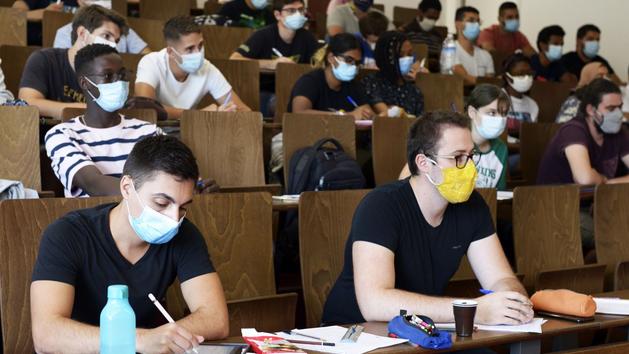Are schools and universities on the way to becoming the main foci of the Covid epidemic?
According to figures published by Public Health France at the end of September, 32% of the clusters under investigation concern the educational environment.
What makes him pass in front of the companies, until then first concerned by the virus.
But the Minister of National Education, Jean-Michel Blanquer, wants to be reassuring about schools, colleges and high schools
.
Read also:
Universities: are the health measures sufficient?
The contagiousness would come, according to him, proportionally more from higher education for several reasons.
Children are still considered by health authorities to be less affected and less contagious than adults.
The age group of 18-29 years, to which the students belong, has been the most affected by the virus since this summer, the latter having in particular a particularly developed social and festive life.
They are not clusters by promotion but clusters by group of friends.
(…) Nothing tells us that contamination occurs within establishments.
The Minister of Higher Education, Frédérique Vidal.
It is impossible to know the infection rate in universities with precision, since Public Health France includes in its figures all students, from kindergarten to university.
But in higher education, from Sciences Po Paris to HEC, passing the universities of Nanterre, Poitiers, Montpellier or Rennes, 25 establishments or university sites are temporarily closed.
The Minister of Higher Education, Frédérique Vidal, repeats that the sources of student contamination are not found in universities: “
These are not clusters by promotion but clusters by group of friends.
(…) Nothing tells us that the contaminations are done within the establishments ”,
she affirmed again Monday evening on Figaro live-LCP.
She is annoyed with the “
traditional back-to-school images
” circulating in the press, those of
“a few crowded amphitheatres in the first year”.
Read also:
Covid-19: are we really three or four times more likely to be infected in bars?
According to her, the risk is "
very probably greater in a bar than in classrooms where everyone is masked
."
An assertion that irritates Rodrigo Arenas, president of the FCPE, the first federation of parents of public education students, marked on the left.
According to him, these comments "
are a diversion
" to camouflage the fact that the universities - despite an increasing budget this year - would not constitute a priority of the recovery plan.
He is also offended that “
students are prevented from living their youth.
We steal it from them
”.
Paul Mayaux, president of Fage, the first student federation, notes that “
we have lecture halls and TD rooms packed to the brim, without respect for barrier gestures, nor for distancing.
When there are 400 in an amphitheater limited to 300, don't let them tell me that it has no impact!
".
Teaching in some 70 universities in France looks like a great patchwork of solutions, from the rational organization of teaching, taking into account health constraints, to the big mess.
The protocol imposes masks and barrier gestures, but not the physical distance of one meter which must be "
sought
" "
as far as possible
".
"
We observe a wide variety of responses from one university to another, from one training course to another, even from one teacher to another,
" notes Franck Loureiro, at Sgen.
The teams are destabilized
”.
Crowded amphis
At Paris-Descartes, in social sciences, undergraduate students have lessons in half-groups every other week.
The rest of the time, they study alone at home.
In Nanterre, Paris-III or Paul-Valéry Montpellier-III, these face-to-face work-study courses have also become the rule.
Since the multiplication of cases of Covid on campuses, the University of Bordeaux-Montaigne has asked all its teachers to take the amphitheater courses at a distance when their numbers exceed 30% of the reception capacity.
“
Some point to a difficult situation.
But the fixed national framework, accompanied by local adaptations, is today the tool most suited to the situation,
”said Olivier Laboux, vice-president of the Conference of University Presidents.
Read also:
Covid-19: is France one of the countries most affected by the resumption of the epidemic?
In recent days, images of crowded amphitheatres have been a big hit on TV news.
"
As in the metro"
, loose Olivier Laboux, who would like to get out of this cliché.
Not all university lecture halls are saturated.
But some formations are and this is not new.
Unlike the hard sciences, law, psychology, medicine and Staps attract too many candidates in view of their reception capacities.
A phenomenon amplified by the demographic boom - 30 to 35,000 additional students each year - and by the record rate of success in the 2020 bac. “
We are no longer duplicating the courses, but looking for additional places.
We are reaching the limit of the exercise
”.
The Covid is now reinforcing the economic difficulties in which the university has been for years. Premises crying out for dilapidation, student registrations more Kafkaesque than ever, and pedagogical engineers who are sorely lacking in order to set up distance education worthy of the name.

